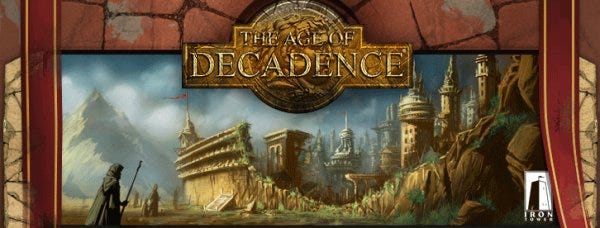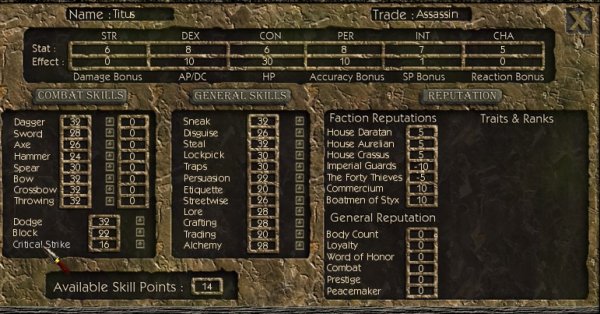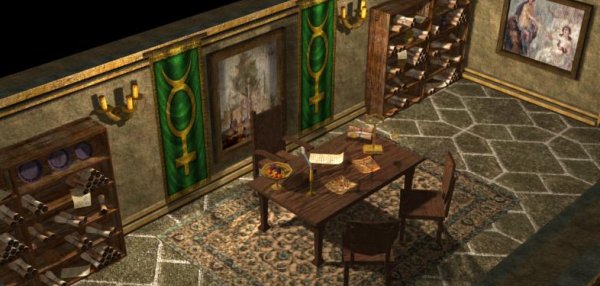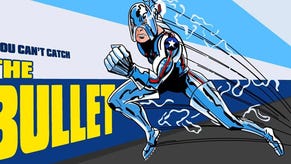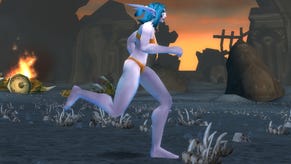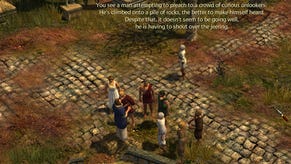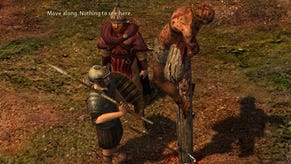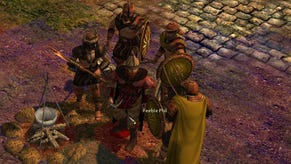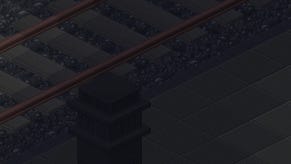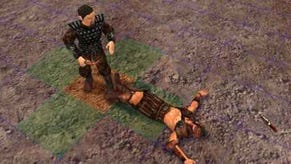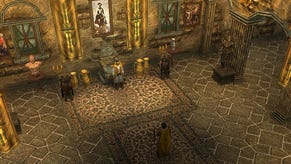Against RPG Decadence: Vince D. Weller Interview
While I'd been following Fallout-but-in-fallout-of-Roman-Empire indie-RPG Age of Decadence's development at a comfortable distance, its world collided with Rock Paper Shotgun when Walker posted a little combat teaser the team behind this indie-RPG had released. The thread exploded with readers rejecting its turn-based formality, and then there was a counter-reaction to that. It basically turned into a debate about what the RPG should be in the modern age, and so when outspoken Lead Designer Vince D Weller started chatting behind the scenes, we decided an interview may be a worthwhile thing.
The results are a slowburn towards something incendiary. Vince is angry at many things, from the industry to the modern RPG, from the expectations of audiences to... many things. In fact, it's somewhat appropriate for a man who steadfastedly believes in multiple-possibilities in the role-playing game, that there's multiple targets for his ire. In fact, there's a good chance that Vince is angry with you, specifically, but his J'accuse ranges further than that. Fireworks are lit beneath the cut.
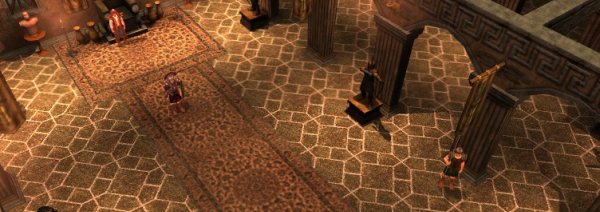
RPS: Big one first - why? Deciding to throw yourself into an indie-game requires a certain sort of mind. Trying to make an enormous multi-pathed RPG from pretty-much scratch... well, that's another. There's not many things as demanding, in terms of content you have to make, game in the world. Why you doing it?
Vince D. Weller: A long time ago I reluctantly installed my first RPG and the concept instantly hooked me up. Ever since then I was an avid and passionate RPG fan. The problem with being a passionate fan of a dying genre is that waiting periods between games worth playing become longer and longer, creating a lot more free time than a gamer knows what to do with. Some people start drinking, I decided to amuse myself shaping some ideas I've had into a game.
In the best role-playing traditions a few similarly minded folks had noticed my efforts and joined me on my quest, forming a party and Iron Tower Studio. So, why are we doing it? For the same reason a writer decides to share a story with the world and an artist picks up a brush and starts painting a naked woman. As for “why RPGs?”, it’s a genre we like, understand (read as “analyzed to death”), and care about the most.
RPS: Following from that, care to tell us a bit about your basic background. Who are you? Who is the team? How did you get together?
Vince: I use the name Vince, because my contract doesn't allow me to manage other businesses openly. Besides, my colleagues wouldn't understand it... I'm a Vice President, Sales & Marketing of a well-known Canadian company. I'm 37 years old and I clearly failed at that growing up thing that everyone's raving about.
Nick’s our programmer. He’s about to graduate from a university (Computer Science and Math). He wrote an isometric 2D engine as his first year project, won several math Olympiads (he thinks that math is fun), and scored a full scholarship. Nick’s godlike programming powahz and dedication made a lot of things I could only dream of possible.
Oscar is the artist. His job is to make the game look pretty. Oscar is mostly known for his work with Oblivion mods, including the most popular Oblivion Overhaul mod, and his Civ 4 mods. Firaxis even used Oscar’s work in the Civ 4 expansion, which scored higher on his “personal achievements” chart than his MBA degree.
The rest of the team includes a modeler, an animator, and a professional composer who did some work for several Russian games.
RPS: That's an interesting position - is it a bit like living a secret life? By day, mild-mannered VP of Sales & Marketting. By Night... Vince, all powerful Indie RPG designer? Is it difficult to keep the two parts fully demarcated in your head?
Vince: No different than having any other hobby. I know people who put a lot more effort into playing golf or drinking every day.
RPS: Well, RPS put a lot of effort into drinking every day. Er.... well, linking back to the first question, when observing your actions, part of me thinks you're driven by a sense of necessity. No-one else is making the game you want to play, so we may as well go and bloody well do it yourselves. Is that a right impression?
Vince: Not really. There is a huge difference between making games and playing them. It's not like I can finish the game, install it, and go "Finally! A game I want to play!". We are making it because we believe we have some good ideas that are worth sharing with people. Considering the interest the game has generated worldwide – from many publishing offers to Future France distributing our video on their magazines’ cover CD, I’d say that our ideas were met with interest.
RPS: That's not quite what I meant. I mean, clearly, doing a game and playing one is a different thing. But... well, a comparison. Bands form making music they'd like to hear in the world, despite the fact they can never appreciate their band like they could if they were listeners... they feel the need to make their music come into existence, because there SHOULD be music like theirs in the world. I was wondering if it was at all like that for you guys. That there should be a game like yours, that there isn't enough annoys the hell out of you, so you have to do it your bloody selves. Does that make sense?
Vince: I humbly disagree, but you get a point for persistence. Even if everyone was making games like AoD, we would have still tried to make one and hope that it would stand out. Not because there should be a game like this, but because we really like to share our ideas with the gaming world. I have no idea how it works with music bands, so I’ll take your word for it.
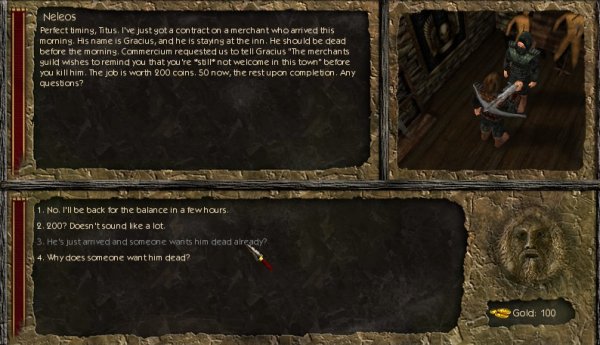
RPS: Okay - Influences then. What influenced your thinking about the game - and I mean, in specifics rather than generalities. In what ways did other games open your eyes, make you realise this is what games could be and why were they wonderful?
Vince: Fallout – a masterpiece that redefined role-playing and set a new standard.
Planescape - reading in a game has NEVER been so much fun, and according to Avellone, never will be.
Darklands - it's easier to list what you couldn't do in that game than what you could do. It saddens me that a game of that caliber won't be made again, but hey, who needs gameplay when you can look at shiny next-generation graphics? m i rite?
XCOM - The king of turn-based gameplay. If you haven’t played it, stop reading this crap and go play it right now.
And finally, Prelude to Darkness, a brilliant indie game that nobody played:
Prelude to Darkness featured an original, very detailed setting, great TB combat system, multi-solution quests, branching main quest, and many innovative design elements. That was the game that inspired me the most. It has shown me that indie projects can easily compete with and even beat “commercial” games in the gameplay and design departments.
RPS: Of the list, Fallout was the one I was sure of. Not just because of the game's mechanics, but because what the setting brings to mind is the post-apocalypse model applied to the fantasy/medieval RPG. That is, a society that is collapsing, and has been for some time - and the player is thrown into it. Is that the impression you were aiming at? Why was this interesting to you?
Vince: Yes, I'm a Fallout fan. *waves at Bethesda* As for the other questions, yes, that is the impression we were aiming at. Why is it interesting to us? It adds another layer to the story and overall atmosphere. It makes a setting more alive as the past in post-apocalyptic games is more than a dry background. It gains shape and become an ever-present ghost of what once was. Besides, when societies collapse, it strips people from artificial restrictions of civilization and reverts them to their natural state, which is always fun to explore.
RPS: What's the problems with the modern RPG? How does Age of Decadence deal with it?
Vince: The problem is simple. Nobody is interested in making dialogue-heavy, turn-based RPGs loaded with meaningful choices and multiple paths. A game like Diablo will always sell more than a game like Planescape: Torment, and games like Torment are much harder to make. So, no publisher is interested in making games like Torment that may or may not sell enough to break even when you can make guaranteed hits like Diablo or Oblivion.
That creates a niche - a market too small for big companies to care about, but big enough for indie developers to play at. Since we can’t match the multi-million budget visuals, we go back to the roots – we focus on gameplay.
RPS: I'll agree that there's an unserved demographic there, and while probably not enough to support a megabudget game, it's enough to support a game. This is as true in the turn-based expansive RPG as it is in any of the other niches which are no longer properly provided by the mainstream (wargames, most flight sims, etc). Do you think we're going to see more people exploring the space you are? How do you see the future of the indie-RPG? How would you like it to be?
Vince: I see the indie industry exploding and successfully competing with the “commercial” games. If we are lucky, maybe it will even bring some long overdue changes. The publishing system must be changed if we want to see original designs and fresh, risky by definition, ideas. Right now it reminds me of a loan-shark operation. You are a fan of Looking Glass Studio, aren’t you, Kieron? How are they doing, I wonder?
Anyway, the foundation for the indy industry is there: good tools, affordable engines, affordable high-speed internet, powerful digital download delivery methods, etc. Now we need more people willing to go the distance.
Spiderweb Software has been making indie RPGs for years. The graphics can blind 75% of your audience – we don’t want that, do we? – so don’t post any screens. Mount & Blade features the best mounted combat to-date and was made by two people. Escape Velocity Nova, a space trader game, had 6 main story arcs. Six. Main. Story. Arcs. Let’s stop for a second and think about this concept. Silently.
Then we have the aforementioned Prelude to Darkness, Fate, Depths of Peril, Eschalon: Book 1, etc. More games are in development - The Broken Hourglass and Purgatorio are good examples. The indie scene is pretty much alive and kicking, and all signs point to increased growth.
RPS: Okay - the thing which caused that mass-pile in the previous RPS thread was the turn based combat, specifically how it looked. I think there's a problem in that it becomes more noticeably odd the more graphics effort a developer makes. The videos you've been releasing demonstrating the combat have that sense of distance due to sitting back and watching the attacks bounce between character to character - but if you treat them as immobile pieces (like, say, in a hex based game) it doesn't phase the gamer. Is this a fair analysis? Or am I full of it? If so, why?
Vince: Have you played Silent Storm? Temple of Elemental Evil? Both games featured excellent turn-based combat and great graphics. Detailed 3D models and animations didn’t create any “odd” feelings but made gameplay more enjoyable, as one would expect.
Your comment implies that you’re looking at TB from the “it doesn’t look real” point of view and that’s where you’re mistaken. RPG combat systems, turn-based or real-time, is no more realistic than hit points (do you really think that someone could recover from a two-handed axe blow and continue fighting like nothing happened?), carrying enough junk to fill a warehouse, spells memorization, rechargeable mana, etc. Frozen in time characters patiently taking blows and waiting for their turns are no more odd or weird than RT’s single characters fighting thousands of enemies and destroying entire armies. These mechanics aren’t about realism, they are about fun.
Now, fun is a very subjective concept. Some people think that playing chess is fun. Some people think that playing in traffic is fun. Go figure. So, if tactical chess-like combat filled with “what happens if I do A vs what happens if I do B vs. …” decisions sounds like fun to you, then you won’t find TB odd or slow. If you prefer non-stop, mindless by definition, action requiring nothing but manual dexterity and fast reaction, then RT is your friend.
Most people see turns as a some kind of relic from the days long gone, a throwback to the old days when electricity wasn’t invented yet and computers were powered by candle light. Some morons even compare turns to a pause, but we shall blame the education system for that.
The main difference between turns and pauses, so brilliantly illustrated by XCOM, is that when your turn is over, someone else’s turn starts, and if you didn’t prepare for that, well, mostly likely you are dead and it’s “game over” for you. In RT it’s perfectly acceptable to run toward a door, open it, hit pause, review the situation, pick targets and start kicking ass in an unbelievable but visually pleasing fashion. In XCOM if you open a door when your turn ends, and a hostile character is in the room, you are dead. What you may see as a flaw is actually a quick test of your tactics employed during your turn. If you fail, your character dies. You need to carefully plan your actions and then you’ll have a chance to beat games like XCOM or Jagged Alliance. Only a chance. I played XCOM for 6 months on my first playthrough. I beat Heavenly Sword in a few days. It’s an amazing looking game, but it doesn’t require much brainpower. If you can hold a controller, you can play and beat the game. See the difference?
RPS: Regarding your thorough take on turn based... well, I take your points (and generally agree) but that's not quite what I was really chasing after. I tend to think most real-time combat in an RPGs can trigger a disconnect as much as a turn-based one - but that's a slightly different issue. What I was trying to draw a line between is the actual feedback on the actions you've ordered - that an animated character taking turns swiping at each other can create that disconnect more than two pieces with no animation just standing by each other, with the game information of attacks being offered in a more symbolic fashion. I'm trying to talk about why some people had that odd response to the video you released, if that makes sense. Do you think the audience just need re-educating of what games can be? Explaining that this system offers so much more to them than a more kinetic presentation would allow?
Vince: Let me ask you one of them rhetorical questions. Is turn-based for everyone? No. Will chess appeal to anyone? No. Casual players prefer to load a game, hit a few buttons and watch their characters kick some ass. They don’t want to play games like XCOM where a single mission can easily take a few hours. Yes, a few hours to kill 20 aliens. Should we be really surprised that in an age of weapons with DPS stats – that’s damage per SECOND – and avg expected kills of 10-15 monsters per minute, spending 2 hours to kill twenty aliens doesn’t sound like fun to some people?
As for the comments in that "let's laugh at turn-based combat together" article, look at what some guy named Kieron said - "I was fine with the turn-based combat, in terms of it being an indie-game and all...". See, he was fine with TB combat because it's an indie game, but if it wasn't an indie game he probably would have written an angry letter to his congressman or maybe even shot someone. Imagine that.
And yes, I understood what you were chasing after, but I guess I failed to explain my point properly. Let me try again using the most important discovery and technological breakthrough of the century - bullet time. Remember Matrix? The first scene, where that cop points the gun at Trinity and says “English, motherfucker! Do you speak it?”, and Trinity says “my turn lolz”, slowly jumps into the air, hangs there for a few seconds, while the cop blinks, and then kicks him? Tell me with a straight face that when that happened you didn’t stare at the screen with an open mouth but said “I call bullshit! That shit is clearly turn-based and it just done ruined my suspension of disbelief!” Tell me that, and being a gentleman, I’ll admit that you have a point.
Now, let’s go back to the responses to that article and take a look at the points your audience made:
“I’d rather puke a lung, to be honest. It would probably be more fun.”
“I am a discerning gamer of the modern age. I demand heads that smush like rotten melons, over then top rag doll death animations and screams recorded live from Nike sweatshops.”
“They took their combat model from Bookworm Adventure. Snore!”
“This is for those times when you want to sit back in your chair and only click the mouse once every 10 minutes.”
“Taking turns fighting may be something “classic” and “niche” audience, but it’s “niche” for a reason, people are looking to new things, and while rolling dice worked for pen and paper, we don’t have to do that anymore and for most people, it’s just not all that fun. Real time is just more immersive for most that want to deal with something that feels more like a real world, not a jumble of numbers and calculations on screen, the illusion is maintained with it off screen, happening in real time while people move and fire freely aiming where they want, when they want, how they want.”
“Wow, I will never play a game like that, ever. I loathe turn-based games, which is the main reason why I refuse to play any Final Fantasy game. It takes me straight out of the immersion of a game when everyone lines up and takes TURNS swiping at each other. Give me something that involves my skill. I absolutely hate it when my hit chance relies on some random dice roll. That is pure and total BS.”
When you have time, Kieron, how about writing an article explaining the difference between RPGs and shooters to your audience? Or maybe an article mentioning that the first computer games were real-time, not turn-based, and disputing the popular opinion that RT is more advanced than TB? I mean, it’s nice that your site tries to attract morons and makes them feel at home, but shouldn’t you be educating them too? It wouldn’t take much to double their IQs, so if you want, I can give you a hand there.
RPS: Okay - Some of your answers seem genuinely angry, or at least frustrated. Who are you most angry at? Are you worried about alienating people who would be interested in your game by showing that, or do you think that your real audience at the people who would empathise and completely understand it? Or do you just not care either way, and would rather speak your mind?
Vince: I'm a big fan of the "honest and blunt" approach. An internet reader has a right to visit a game site and read “Did Oblivion really suck or what?” or “Molyneux has gotta be on drugs!”, don’t you think? Instead every journalist pretends that Oblivion was a 10/10 brilliant masterpiece, that Molyneux isn’t a lying old kook, and that Dungeon Siege wasn’t a screensaver. Then Chris Taylor says that he's making Space Siege even simpler and everyone nods in agreement: Right on, man! It’s about time someone makes a game for the amputees. BRA-VO!
And no, I don't really care who'd think what and how my comments would affect sales. I'm making this game on a bold assumption that there are some people out there who are interested in complex games that aren't made for retards. Btw, did I mention that I was the editor of RPG Codex for 4 years? Perhaps you've read my Oblivion review and other critically acclaimed articles/interviews? Now you probably understand where I’m coming from a bit better.
Overall, I've witnessed the trend from simple graphics-amazing gameplay to amazing graphics-simple gameplay. Can't say I'm too happy about it. Take X-COM for example:
1994: It took 7 people to make X-COM: UFO Defense. Two guys who did both design and programming, 2 artists, 2 music/sound guys and a project manager.
1996: It took over 30 people to make a "more of the same" sequel. Now we have 4 assistant producers, 12 artists, 6 level designers, etc.
1997, XCOM: Apocalypse, a game that kinda sucked. Over 50 people team. 5 sound guys. 21 artists. An army of level designers. We even have a brand manager now. Good times are about to roll.
2001: X-COM: Enforcer or Say Goodbye to the Series. Great job managing the brand, assholes.
Do you see my point? I mean, what are the odds of seeing games of X-COM or Darklands caliber again? Let's end the interview with your own thoughts about the state of the gaming industry. *passes the microphone to Kieron and opens a bag of popcorn…
RPS: From the mainstream industry as is? Not a chance in hell, unless the industry crashes in flames and we begat a new mainstream on a completely different basis. In terms of an indie dev? Hell, yeah. As you point out, it took 7 people to make X-COM - and I was following the Gollops all the way through the eighties, and love what they did with even fewer people (I don't really have a favourite game of all time - I'm against it in principle - but if I'm asked, I normally mention the Gollop's Chaos). There's
indie teams working with that number of people. Why can't they produce something similarly brilliant? They're not any less talented. They require an infrastructure - which is building - and an attitude change in gamers - which will follow when there's games that walk it like they talk it.
(I'll stress that I'm taking "Caliber" to be a literal case of "Sharing the same qualities that made UFO and Darklands great". I think the mainstream industry has had successes in completely different areas. I also disagree that those reasons are as easily dismissed as shallow as you do - but I am and always have been a generalist in my interests in games, including just about everything.)
In really short: Will there ever be a game of X-com or Darklands caliber again? That ball's in your court. Play it.
Thanks for your time.
Age of Decadence will be released when it's done. That'll probably be this Fall.
